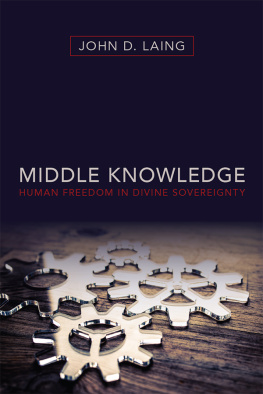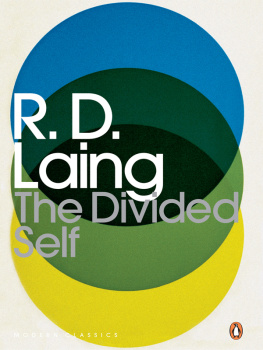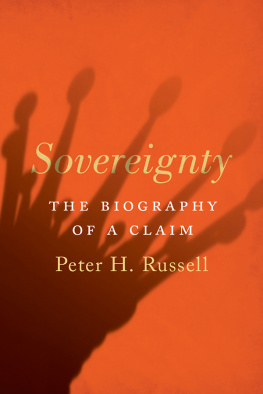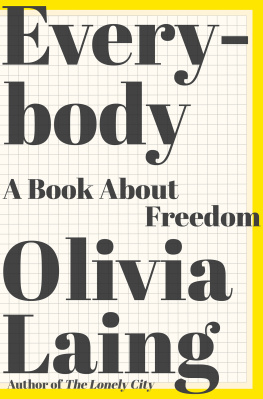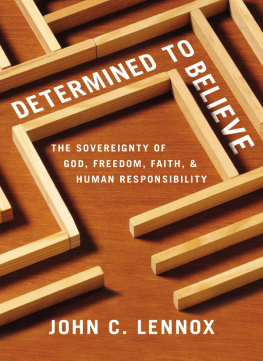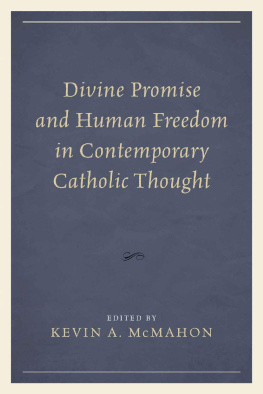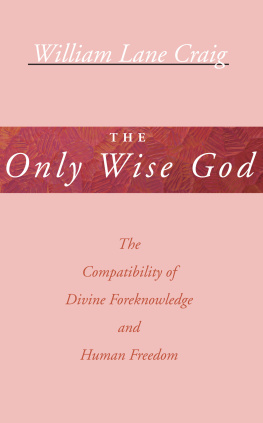Laing - Middle Knowledge: Human Freedom in Divine Sovereignty
Here you can read online Laing - Middle Knowledge: Human Freedom in Divine Sovereignty full text of the book (entire story) in english for free. Download pdf and epub, get meaning, cover and reviews about this ebook. City: Chicago, year: 2019, publisher: Kregel Publications, genre: Religion. Description of the work, (preface) as well as reviews are available. Best literature library LitArk.com created for fans of good reading and offers a wide selection of genres:
Romance novel
Science fiction
Adventure
Detective
Science
History
Home and family
Prose
Art
Politics
Computer
Non-fiction
Religion
Business
Children
Humor
Choose a favorite category and find really read worthwhile books. Enjoy immersion in the world of imagination, feel the emotions of the characters or learn something new for yourself, make an fascinating discovery.
Middle Knowledge: Human Freedom in Divine Sovereignty: summary, description and annotation
We offer to read an annotation, description, summary or preface (depends on what the author of the book "Middle Knowledge: Human Freedom in Divine Sovereignty" wrote himself). If you haven't found the necessary information about the book — write in the comments, we will try to find it.
Laing: author's other books
Who wrote Middle Knowledge: Human Freedom in Divine Sovereignty? Find out the surname, the name of the author of the book and a list of all author's works by series.
Middle Knowledge: Human Freedom in Divine Sovereignty — read online for free the complete book (whole text) full work
Below is the text of the book, divided by pages. System saving the place of the last page read, allows you to conveniently read the book "Middle Knowledge: Human Freedom in Divine Sovereignty" online for free, without having to search again every time where you left off. Put a bookmark, and you can go to the page where you finished reading at any time.
Font size:
Interval:
Bookmark:

Middle Knowledge: Human Freedom in Divine Sovereignty
2018 by John D. Laing
Published by Kregel Publications, a division of Kregel Inc., 2450 Oak Industrial Dr. NE, Grand Rapids, MI 495056020.
All rights reserved. No part of this book may be reproduced, stored in a retrieval system, or transmitted in any form or by any meanselectronic, mechanical, photocopy, recording, or otherwisewithout written permission of the publisher, except for brief quotations in printed reviews.
Unless otherwise noted, Scripture quotations marked HCSB have been taken from the Holman Christian Standard Bible Copyright 1999, 2000, 2002, 2003 by Holman Bible Publishers. Used by permission.
Scripture marked NASB taken from the NEW AMERICAN STANDARD BIBLE, Copyright 1960, 1962, 1963, 1968, 1971, 1972, 1973, 1975, 1977, 1995 by the Lockman Foundation. Used by permission.
Scripture marked NRSV taken from the New Revised Standard Version Bible, Copyright 1989, by the Division of Christian Education of the National Council of the Churches of Christ in the United States of America.
Scripture quotations marked ESV are from The Holy Bible, English Standard Version (ESV), copyright 2001 by Crossway Bibles, a publishing ministry of Good News Publishers. Used by permission. All rights reserved.
The Greek font, GraecaU, is available from www.linguistsoftware.com/lgku.htm, +1-425-775-1130.
ISBN 9780825443305
Printed in the United States of America
18 19 20 21 22 / 5 4 3 2 1
DEDICATED TO
MY WIFE, STEFANA,
AND OUR CHILDREN,
SYDNEY, SOPHIA, AND ALASDAIR,
AND TO MY PARENTS,
ED AND LIZ LAING
O ne of the most widely held doctrines of Christianity is that of meticulous divine providence. The doctrine of providence refers to Gods governance and preservation of the worldhis ongoing activity in the creationand it is meticulous, because it refers to the smallest details of all events. Thus, we speak of God being in control of all things, and as Helm rightly notes, this is no mere academic exercise: Far from studying what is static or abstract, we are to be concerned with Gods action in our world, and with how, according to Scripture, that activity is carried out. Providence is as much a concern of practical/applied theology as it is of systematic and philosophical theology, and therefore, this book should be of interest to all Christians.
Scripture supports belief in meticulous providence, noting that (for example) it is God who makes the clouds rise and the rain fall (Ps. 135:67), and ensures the successes of individuals and nations (Job 12:23; Ps. 75:67). God is providential over salvation. The apostle Paul assures the Ephesians that their salvation was part of Gods plan, noting that God works all things after the counsel of His will (Eph. 1:11). Similarly, Gods providence applies to the specific destinies of individuals. The Lord declares to both Jeremiah and Isaiah that they were appointed prophets before their conceptions (Jer. 1:5; Isa. 49:16). Providence also refers to Gods sustainment of the natural order. For example, God causes the grass to grow (Ps. 104:14; cmpr. Jesus's statement that he clothes the grass of the field, Matt. 6:30). Somewhat related, the Psalmist declares that God gives the lions their food (Ps. 104:28), but this passage also highlights a key difficulty with meticulous divine providence, namely the problem of evil and suffering. Since lions are carnivores, when God provides their food, he hands over a poor zebra or wildebeest. Any robust view of meticulous providence must deal with this issue.
Several models of providence have been articulated in the history of the church. It is best to group them according to how they explain the relationship between Gods control, creaturely (i.e., human) freedom, and evil and suffering. Five basic approaches are discussed in theological circles: Process Theology (or Finite Godism), Open Theism, Arminianism/Middle Knowledge, Calvinism, and Theological Fatalism. Two have been largely dismissed as heretical/unorthodox (Process Theology and Theological Fatalism), one is typically thought to be heterodox (Open Theism), and two have been widely held among orthodox Christians (Arminianism/Middle Knowledge and Calvinism). I will argue that middle knowledge best deals with the issues at hand. It is my hope to offer a less philosophically rigorous and more biblically and theologically oriented explanation. But first, a word or two about each of the alternatives is in order.
Process Theology is a uniquely American movement. It grew largely out of the philosophical work of Alfred North Whitehead and was popularized by Charles Hartshorne, John Cobb, David Griffin, Shubert Ogden, and others. Much of the discussion surrounding Process Philosophy and Theology is rather technical and can be dense, so we will focus on the basic ideas and their impact upon the Process view of providence.
Perhaps the most characteristic feature of Process Theology is its emphasis on change as fundamental to reality, or in traditional philosophical categories, the primacy of becoming over being. It is often presented as an alternative to traditional Christian theology. For example, in his provocatively entitled work, Omnipotence and Other Theological Mistakes, Hartshorne sets forth what he calls six common errors about God that have pervaded classical theism in the West: God as absolutely perfect and therefore unchangeable; Omnipotence conceived as power to act; Omniscience as knowledge of all things; Gods unsympathetic goodness (or impassibility); Immortality as a career after death; and Revelation as infallible. The primacy of change in Process thought extends to God himself, who is conceived as the Process of Reality Itself. It should come as no surprise, then, that Process Theology is panentheistic and sees all of reality in God. He is the sum total of all things (to be distinguished from pantheism, which says that all things are God/gods), and when things change in the world, God is also changed.
This emphasis on love is thought to distinguish the God of Process Theology who is eminently loving and relational (requiring change) from the God of so-called classical theism, who is impassible and immutable. Hartshorne argues that if humans add something of value to the life of God, then he can change for the better, and this should not be seen as a defect, but rather a necessary corollary to his relational nature. Just as loving human relationships are characterized by respect for the individuality of the other, so also is divine love for creatures. God does not cause events to occur or force persons to act in certain ways; rather, he lovingly suggests or persuades persons to do what he wishes for their good. Second, if God did control everything, then he would be the cause of evil. Process Theology prides itself on the strength of its theodicy. In the Process view, God is in no way responsible for evil because his providence is not causative. In fact, he quite literally cannot cause or prevent evil and is simply part of a process that includes evil!
Ironically, this strength for its theodicy also serves as a weakness for its eschatology. Providence through persuasion cannot guarantee that Gods will can prevail or that he will emerge victorious. Cobb and Griffin admit as much when they note that the Process God cannot prevent specific evil acts.
Process theism... cannot provide the assurance that Gods will is always done. It does affirm that, no matter how great the evil in the world, God acts persuasively upon the wreckage to bring from it whatever good possible. It asserts that this persuasive power with its infinite persistence is in fact the greatest of all powers. But it does not find in that assertion assurance that any particular evil, including the evil of the imminent self-destruction of the human race, can be ruled out. God persuades against it, but there is no guarantee that we will give heed.
Font size:
Interval:
Bookmark:
Similar books «Middle Knowledge: Human Freedom in Divine Sovereignty»
Look at similar books to Middle Knowledge: Human Freedom in Divine Sovereignty. We have selected literature similar in name and meaning in the hope of providing readers with more options to find new, interesting, not yet read works.
Discussion, reviews of the book Middle Knowledge: Human Freedom in Divine Sovereignty and just readers' own opinions. Leave your comments, write what you think about the work, its meaning or the main characters. Specify what exactly you liked and what you didn't like, and why you think so.

